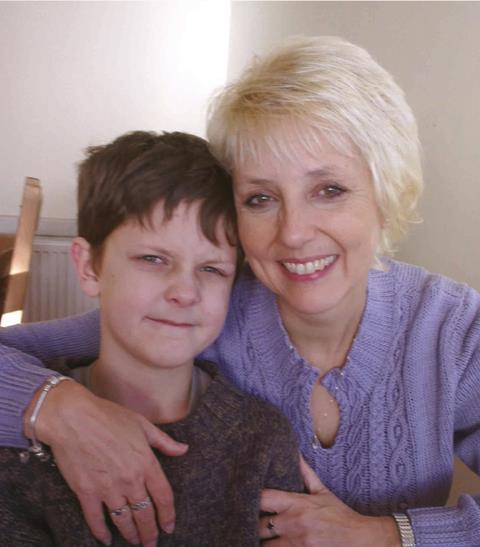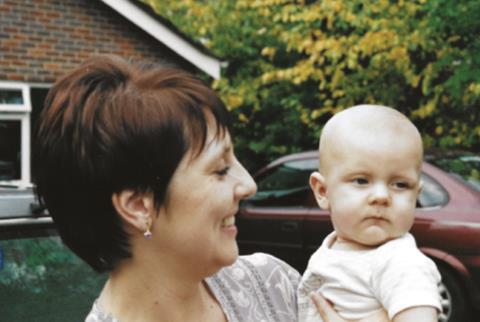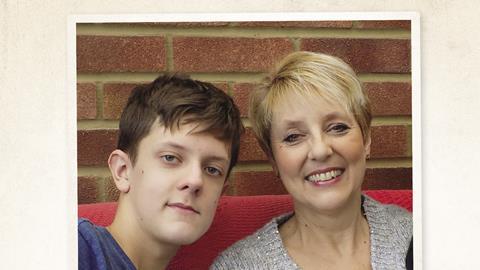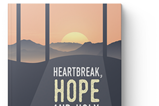Writing ahead of World Suicide Prevention Day, and one year on since her son, Leo, took his life, Rev Sharon Grenham-Thompson explains how she’s gradually moving from asking ‘Why God?’ to ‘What now, God?’
After a miserable summer, I was looking forward to this particular Friday evening. It was early September 2021. The weather was finally warming up, my eldest daughter was coming to visit for the weekend to see our new house for the first time, and my two teenagers were back to school the following Monday, with an exciting year ahead.
For my youngest, Gabriel, this was his first year of sixth form; and for his older brother, Leo, it was the much-anticipated final year. A-levels, university applications and Leo’s 18th birthday were on the horizon, my husband’s business had survived the pandemic and my work as a busy parish vicar was going well. I allowed myself a little smile of relief.
But despite my optimism, there’s no doubt the previous year and a half had been very challenging. Covid had caused serious disruption to GCSEs and school routines and supporting two teens was complicated. I was exhausted from the sometimes overwhelming demands of ministry in the ‘new normal’ and had taken very little real time off.
But top of my concerns had been Leo, who had been suffering with serious depression for well over a year. Things had got so difficult for him that he had admitted to suicidal thoughts, and even an attempt to carry out those thoughts, at the beginning of 2021. Accessing mental health support hadn’t been easy, and what we did access was patchy, but we were an open and supportive family.
He had been taking antidepressants since May and he was receiving some counselling. Despite Leo’s troubles, and the complications that came with his being on the autistic spectrum, things were looking promising.

Dark thoughts
As I pottered around the house that Friday afternoon, I thought back to a few days previously, when we had an unexpected call from the police in the middle of the night. They had wanted to do a ‘welfare check’ on Leo, as some of his online friends were concerned about posts he had made on social media.
This was a total shock, and very scary, but Leo was safe in his room. He reassured the officers, and me, that he had simply shared some “dark thoughts” but that he was OK. Nevertheless rattled, I made sure to check the house for potential items with which he might harm himself. I arranged some time off work and called the mental health crisis line.
As the week went on, Leo’s mood improved and, by Thursday evening, he was back to normal. So much so that when he announced he was going into town by bus on Friday afternoon to buy some books for school and “maybe stay and have a coffee”, I was not overly concerned.
I checked with him that he felt safe, recovered and stable. As he had done with the three professionals he’d spoken to that week, he assured me he was fine. “It will do me good,” he said. So I wished him a good time. Then about half an hour later, I left the house to run errands. My husband said Leo left shortly after I did.
Now here I was, finishing the preparations for my daughter’s visit, tidying up in the garden and thinking it was just about time for a cup of tea. It was 4pm and I guessed Leo would be back soon. Just then Gabriel put his head out of the patio door. “Can you come to the door, Mum?” he said, looking puzzled. “The police are here.”
“How lovely,” I thought. “They’ve come to follow up on Monday night. Shame Leo’s out.”
Two young officers were hovering nervously at the front door. “Come in!” I smiled and stepped back.
“Er…are you Sharon?” asked the male officer, not moving.
And, in that moment, I knew my world had been shattered.
Leo, my beloved, complicated, brilliant son, took his life at just before 2pm on Friday 3 September 2021.
I remember very little from those first hours and days. I’m told I screamed and screamed, and eventually collapsed. Officers from British Transport Police came and went. My husband made phone calls.
Poor Gabriel hovered, and I presume someone fed him. My daughter arrived. And then, some hours later, while searching for information, I stumbled across scheduled social media posts that Leo had left for his friends, to be seen postmortem, complete with haggard selfie so he could be identified. The horror pierced my soul.
I didn’t sleep that night, nor indeed the night after. I finally succumbed, near delirious, part way through Sunday morning. It took me another four days to consume anything other than copious amounts of tea.
But the horror didn’t stop. Due to his injuries, I never saw Leo’s body. The police took away personal items so he could be identified by DNA. It took another two and a half weeks for him to be released by the coroner. We had to give statements to the police, tell our wider family and cope with the bureaucracy of a sudden, violent death.
Over it all was this bewildering sense of unreality. Everywhere I turned, there was evidence of Leo’s life – his shoes in the hall, his favourite food in the kitchen, his schoolbag ready for the start of term.
I sat in his room and his presence was so strong. Surely, he’d be back any minute with a sheepish: “Sorry, Mum.” Even his funeral, held a month after his death in my church and attended by hundreds, didn’t break through that sense of unreality.
As the weeks, and now months, have unfolded, I’ve had to try to accept that he is not coming back. The tsunami of grief has been brutal. Although I’ve lost grandparents and beloved pets, I have never experienced the death of someone so very close.
The death of a child is the one thing that people say should never happen – although of course it does, far too frequently. Once you add in the fact that this unthinkable death was a suicide, the devastation is something akin to a bomb going off.
I’ve had to comprehend that my life – our lives – changed forever that day; a change that was unwanted, unexpected and undeserved. It has rocked my whole self, my sense of purpose, of vocation and of faith.

Why, God?
I’ve been ordained for 24 years, but I’ve run the whole gamut these past few months – God is a delusion, God is (insert expletive), God is cruel, God has abandoned me, God is punishing me. Why God? Where are you God?
Please be there God, God help me. I remember driving in the car one day (a good place for yelling) and shouting at God: “It’s all right for you, you got your Son back!”.
If I’m honest, I’m still working through all that. I’ve been away from ministry for much of the past year, only recently returning on a phased basis. I’m expecting it to take me several more months before I’m firing on even half of my cylinders.
I’ve been diagnosed with depression and post traumatic stress disorder as a result of Leo’s death, which only serves to complicate the pain of grief. As a family, we’ve had to navigate our own individual responses and remould ourselves collectively around the aching gap that Leo has left behind.
Our sense of predictability and safety has been shattered. When you’re also feeling conflicted about the one you’ve given your life to serve, there’s very little solid ground.
But gradually, I’ve come to see moments of light and love in it all. The support I’ve received from Leo’s (mostly online) friends has been astounding – young people reaching out, often from a different continent, to offer messages of care or memories, telling me how much my son meant to them.
Complete strangers on social media checking in with me regularly with words of encouragement when the times have been darkest. A friend driving hundreds of miles to give me a hug. Family members stocking up our fridge. Schoolteachers doing everything they can to support the whole family.
Ministry colleagues bringing food and a listening ear; parishioners sending cards. It has made me think of those words from 1 John 4:16: “God is love. Those who live in love live in God and God lives in them” (NCV).
I still cry most days. I still feel lost and empty at times. The “valley of the shadow of death” (Psalm 23:4, NKJV) is long and dark, but as some sort of functional stability has crept up on me, I’ve been able to sense God’s hand again.
I’m changed, certainly. What matters has changed. I find the minutiae of parish life no longer occupies me and a deeper pastoral call is rumbling somewhere in the distance. I’ve begun to train in counselling and psychotherapy, in the hope that I can offer a more expert listening ear to those who need it.
despite the pain, God is there
I’m acutely aware of the mental health provision gaps in this country and want to use what platform I have to highlight that lack and campaign for more, and better. I do what I can to de-stigmatise the issue of suicidal feelings as well as being open about the effects of such a devastating event.
There are so many suffering and grieving people. It seems that our young people are bewildered, alienated and lonely. We have to change this.
September 10 is Suicide Prevention Day – an opportunity to raise awareness of the pain suffered by those who choose this way, and those who are left behind. We were a normal (I thought) happy family. Leo was clever, loved and had a bright future. But still he was taken from us.
Desperate, dark feelings can strike anyone. There are many resources to be found; mental health first aid training is available. But we need to rebuild our communities, improve the professional provision and make a way to allow those struggling with exclusion, stigma and fear to find a safe, non-judgemental place; a haven that requires nothing of them, but offers only love and acceptance.
I don’t believe God willed such a terrible death for Leo, or such pain for us. I’ve had to combat a wrenching sense of my son being snatched away by malign forces. One of the early things I did was go to the place where he died and reclaim it, and him, for love. It’s back to that word again – love. Love that is “as strong as death” (Song of Songs 8:6). Love that “endures all things” (1 Corinthians 13:7, NKJV).
What now, God?
The inquest process is still ongoing – something else I never imagined I’d have to experience. But even when it is completed, I don’t suppose I will have any of the answers I want – mostly to the question: “Why?” Not from Leo, not from life, not from God. I probably never will.
But I’m beginning to find a way to live with that, and to ask a different question: “What now?” How do I take this terrible experience and weave it into my story in a way that acknowledges the bitter pain but defies the ever-present sense of futility? In confronting the agony, I’ve found the psalms of lament speak to me, especially Psalm 88.
It ends with no answers, only questions, and yet a continued deep knowledge that despite the pain, God is there. I’m reminded that many of God’s people over the millennia have lived their entire lives without resolution of their questions or sorrows. Countless mothers have lost their sons. Somehow, there’s comfort in that knowledge: a community, a “cloud of witnesses” (Hebrews 12:1).
I wonder if there’s some wisdom here for our own witness in a society that has suffered so much through the pandemic and more – not offering easy answers or promises of triumph, not strategies or even jolly gimmicks, but instead sitting with the sorrow and questions, and offering simple, practical love.
In the quiet act of presence, we perhaps proclaim most powerfully that God is with each one of us.
World Suicide Prevention Day is taking place on 10 September. If you would like to support a charity walk raising funds for the work of Sharon’s chosen bereavement charity, visit suicideandco.enthuse.com/pf/richard-thompson





































No comments yet